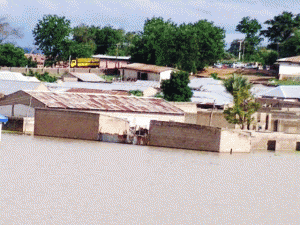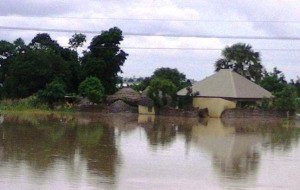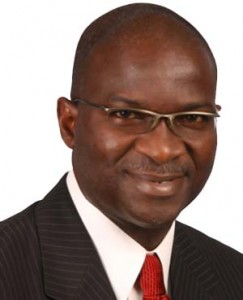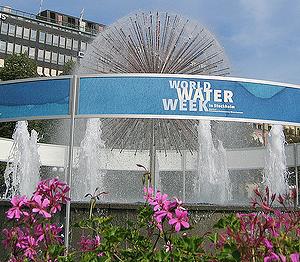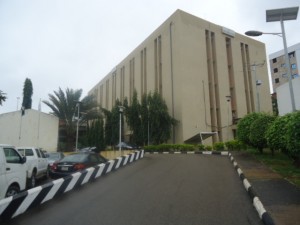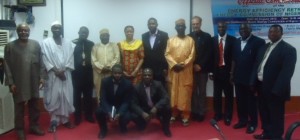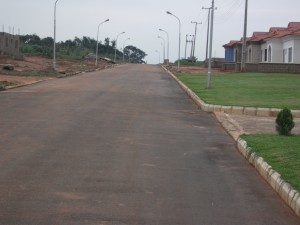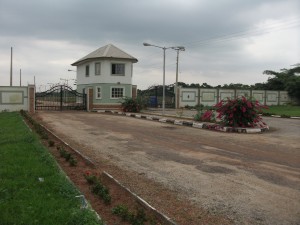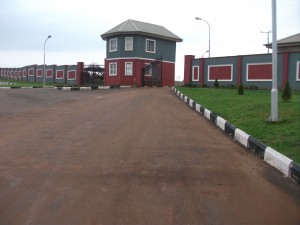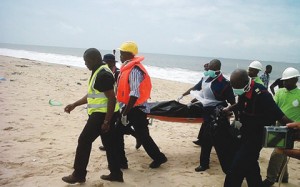The plenary session of the informal session of the Ad Hoc Working Group on the Durban Platform (ADP) held on 30 August saw a strong and united call by developing countries for the Working Group’s outcome to be in accordance with the objectives, principles and provisions of the UNFCCC, in particular the principles of equity and common but differentiated responsibilities (CBDR) and respective capabilities.
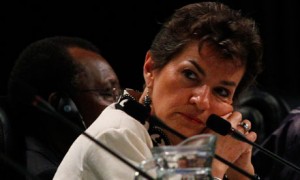
This call was led by the G77 and China and echoed by several groupings of developing countries. Developing countries also called for the agreed outcome not to lead to a rewriting, reinterpretation or replacement of the Convention and its annexes, which distinguishes the obligations of developed and developing countries.
Developed countries on the other hand, led by Australia for the Umbrella Group (which includes the non-European developed countries), and the European Union indicated the need for a global agreement post-2020 which required “updating the regime with 21stcentury realities” and “evolving capabilities in the contemporary context”. The Umbrella Group also called for “a new global agreement with a common legal platform which responds to the diversity and current realities.”
The ADP is tasked with coming up with either a “protocol, another legal instrument or an agreed outcome with legal force” by 2015, in order to implement climate actions from 2020 onwards. The session which began on 30 August will end on 5 September, 2012, and is held in conjunction with the meetings of the other two Ad Hoc Working Groups under the Bali Action Plan and the Kyoto Protocol.
Earlier in May this year, at its inaugural session in Bonn, the agenda for the ADP was adopted, where two workstreams were initiated – one addressing matters related to paragraphs 2 to 6 of the Durban Platform decision (decision 1/CP.17) and another addressing matters related to paragraphs 7 and 8 of that same decision. (Paragraphs 2 to 6 relate to the agreed outcome envisaged for the post-2020 climate regime while paragraphs 7 and 8 relate to enhancing the mitigation ambition in the pre-2020 time frame.) The Co-chairs of the ADP are Mr. J. Mauskar (India) and Mr. Harald Dovland (Norway).
On the issue of the pre-2020 mitigation ambition, many developing countries stressed the need to sequence the work of the workstream so as not to jeopardise and undermine current on-going negotiations in the other two Working Groups.
Dovland, in his opening remarks said that the current informal session in Bangkok is not to take formal decisions on the organisation of, but to clarify the work to be done under, the two workstreams. He said that some Parties had wanted contact groups to be initiated in the Bangkok session. Dovland said that when the session resumes in Doha, Qatar later this year, the co-chairs would launch the idea of having contact groups and other ways of dealing with the work.
He explained that in the first half of the session which will be held from Thursday (30 August) till Saturday, 1 September, roundtable discussions will be held on each of the two workstreams. The discussions will focus on the “vision for the ADP” (workstream 1) and “ambition” (workstream 2). The roundtables are meant to be interactive and the co-chairs want to hear concrete ideas on what we are going to do and how.
Dovland said that the co-chairs intend to prepare summaries of the discussions and make these available on the website for Parties to “use it or throw it away”. Following the introductory remarks, the session was suspended for lunch and resumed in the afternoon to hear statements from Parties and groupings, after which the first roundtable discussion was convened.
Algeria speaking for the G77 and China said that progress in the Durban Platform (DP) is critical for taking the Convention forward. However, work must ensure a strong linkage between mitigation, adaptation and means of implementation, in a balanced manner, as is reflected in the Convention. The negotiations and outcome of the DP process must be in accordance with the objective, principles and provisions of the Convention, including the principles of equity and common but differentiated responsibilities (CBDR) and respective capabilities. Any planning of the work should be based on decision 1CP/17. It should also be comprehensive, inclusive and equitable in scope given the urgency of responding to climate change and the vulnerability of our members to the adverse impacts of climate change.
Argentina speaking for Algeria, Argentina, Bolivia, China, Cuba, Democratic Republic of the Congo, Ecuador, Egypt, El Salvador, India, Iran, Kuwait, Malaysia, Mali, Nicaragua, Pakistan, Philippines, Saudi Arabia, Sri Lanka, Sudan, Thailand, and Venezuela said that this informal session is not a negotiating session but rather an informal initial discussion designed to enable the Parties to explore and discuss the issues relevant to the work and mandate of the ADP. It reiterated that, first and foremost, the work in the ADP is under the Convention, and therefore, must adhere to the provisions and principles of the Convention, in particular the principles of equity and CBDR.
It added that the mandate of the ADP is to develop “a protocol, another legal instrument or an agreed outcome with legal force “under the Convention,” which means adherence to the provisions of the Convention, with no amendment, replacement or reinterpretation of the Convention and its annexes.
Argentina said that any outcome under the ADP under the Convention applicable to all Parties must ensure that universality of application is not uniformity of application, since the latter concept implies that there would be the same mandatory nature of obligations for both developing and developed countries and which would go against the principle of CBDR. The first and overriding priorities of economic and social development and poverty eradication on the part of developing countries must also be ensured.
It stressed further that the decision establishing the ADP was part of a delicate overall package in Durban that includes a meaningful second commitment period of Kyoto Protocol, the understanding that developed countries will undertake commitments for deep emission reductions, and successfully completing the work in the Ad-hoc Working Group on Long-term Cooperative Action (AWG-LCA) particularly the comparability of mitigation efforts amongst the Annex I Parties up to 2020 and their provision of finance, technology and capacity building to developing countries under the Convention. Therefore the negotiations and progress in the ADP are intrinsically connected to the developments and conclusion of the KP and the LCA tracks.
Argentina said the ADP should not become the means by which developed countries jump-ship from their legally binding commitments under the Convention. Itshould not duplicate nor prejudice negotiations and work already being undertaken in the various subsidiary bodies, including the other AWGs. The ADP should not take away from the time, energy or resources for the successful conclusion of the AWG-KP and the AWG-LCA and this is the precondition for the ADP to proceed. The outcome of the work of the AWG-DP can be an effective vehicle in the struggle to address climate change through the strengthening of the multilateral regime under the Convention in accordance with its principles and provisions, and covering all relevant and interlinked issues, notably the building blocks of mitigation, adaptation, finance, technology and capacity building.
Argentina also said that avoidance of unilateral measures is another necessary confidence building measure that is a part of the Durban package. Unilateral actions in the name of climate change must not damage the multilateral negotiating process. Italso reminded Parties of the recently concluded Rio+20 Conference outcome document where Heads of State recalled in the outcome document that “the UNFCCC provides that Parties should protect the climate system for the benefit of present and future generations of humankind on the basis of equity and in accordance with their common but differentiated responsibilities and respective capabilities.” Argentina added that the legal form of the outcome under the ADP should not be decided on up-front, nor should discussions on this be an immediate priority, but such discussion should be phased in at an appropriate time, when the negotiations on substantive issues evolve and mature.
Swaziland for the African Group said the ADP negotiations should culminate in an enhanced multilateral rules-based regime that ensures the full, effective and sustained implementation of the Convention and keeps temperature well below 1.5 degrees C. The outcome is to be “under the Convention”, as agreed in Durban, and so must conform to all of the Convention’s principles and provisions including historical responsibility, CBDR and the overriding priorities of developing countries which reconfirmed at RIO +20. To facilitate a smooth transition, all mechanisms developed under the Bali Roadmap should be fully operational before the outcome comes into effect.
The outcomes should be balanced in dealing with mitigation and adaptation, and should ensure that adequate, sustainable, additional and predictable means of implementation – finance, technology and capacity – are provided to developing countries in line with the Convention and their needs, taking into consideration the time needed for developing countries to achieve their economic development in a sustainable manner, added Swaziland.
The priorities for Africa are sustainable development and poverty eradication. Therefore, outcomes of our work should reinforce a fair, multilateral rules based regime, that brings to effect the right to equitable access to sustainable development, the equitable sharing of atmospheric space and resources, taking into account the cumulative historical responsibility and use of such resources by Annex I Parties.
It expressed their deep concern that the inadequate mitigation pledges, notably by Annex I Parties under the Cancun decisions, risk an increase in global average temperature of greater than 2ฐC – and possibly as much as 5ฐC. Temperature increases of these levels will have catastrophic impacts worldwide, and particularly for Africa due to its high vulnerability to the impacts of climate change and low adaptive capacity. Ambition must be increased immediately through deep emission reductions by Annex I Parties under the KP, and through comparable efforts for Annex I non-Kyoto Parties under the Convention. Annex I Parties are called on to remove conditionalities, move up to and beyond the high end of their pledges, and agree an aggregate commitment that reflects science and equity.
The African Group has called on Annex I Parties to reduce their emissions by at least 40% by 2017 as an equitable and appropriate contribution to achieving the objective of the Convention. It must be ensured that emission reductions are real and called on Annex I Parties to ensure the environmental integrity of their emission reduction commitments, and to guarantee an equitable and appropriate level of domestic emission reductions, by closing existing loopholes, limiting the use of carbon markets and project-based mechanisms to 10% of their commitments, and ensuring the additionality of carbon credits.
Gambia for the Least Developed Countries (LDCs) said that the ADP should take into account the principles of equity and CBDR, with the aim to limit warming to well below 1.5 degree C. It envisioned the work of the ADP to result in a ‘protocol’ under the Convention, which included mitigation, adaptation, finance, technology transfer and capacity building and transparency of actions in a balanced way. It added that failure to act to close the mitigation ambition gap prior to 2020 will have disastrous consequences. The ADP must prioritise this work and have a workplan to close the gap.
Nauru for the Alliance of Small Island States (AOSIS) said that the pre-2020 mitigation workplan was an absolute redline for AOSIS as it was the only reason it agreed to allow the postponement of the application of a new legally binding protocol until 2020. Enhancing pre-2020 mitigation ambition is essential in order to minimize the adverse and avoid potentially catastrophic impacts of climate change in all countries and the survival of SIDS. It will be difficult to proceed very far in discussions on the new protocol until we know that the pre-2020 mitigation gap will be closed. We cannot know if we are negotiating an agreement for a below 1.5 degree C world, or a plus 3, 4, 5 degree C world. It asked if it could rely on the Adaptation Committee to completely relocate all of our critical infrastructure further inland and if the Green Climate Fund will be able to pay for it all.
It added that if we do not close the gap, the mitigation cuts that would be required post-2020 to preserve even a small chance of achieving our agreed long-term temperature goal would need to be so drastic that they would stretch the limits of technical, economic, and political feasibility. Accordingly, the workplan on enhancing mitigation ambition must be prioritized under the ADP as a matter of urgency so that immediate and meaningful progress is made towards closing the ambition gap. The mitigation ambition workplan should support, not detract from on-going efforts to raise ambition under the AWG-LCA and AWG-KP so that those bodies can reach a successful completion of their work in Doha. The ADP should not be a forum for renegotiating the principles of the Convention. The principles of the Convention should guide the work under both work streams.
Egypt speaking for the Arab Group believed that progress in the ADP is linked to progress in the other two working groups. In terms of the order and sequence of the work, we need to see balanced progress on all issues, and under each of the working groups. This requires more progress in particular in relation to the KP and the AWG-LCA. It said that weare yet to see the kind of ambitious emissions reduction numbers (under the KP for the second commitment period), that are of a legal nature that provisionally enter into force pending their ratification.
It reaffirmed that upcoming negotiations have to reflect the responsibility of Annex 1 countries for taking the lead in reducing emissions, and the responsibility of developed countries to the provision of finance and technology to developing countries to adapt to the negative impact of climate change and response measures, and that they help them contribute to the international efforts to reduce emissions without putting in jeopardy their development prospects nor transferring to them the burden of filling the gap between the goal of the temperature rise and the modest goals by Annex 1 countries for reducing their own emissions.
It also stressed that the ADP outcome will have to be under the Convention, and should adhere to its provisions and principles. It also referred to the Rio+ 20 outcome which reaffirmed this. The starting point has therefore to be the historical responsibility of developed countries and the fact that they should take the lead in addressing climate change and in helping developing countries adapt to it and contribute to mitigation efforts. We need to examine how to best incorporate national circumstances and the various facets of vulnerability. In reference to the ADP outcome being “applicable to all”, Egypt also emphasized that universality does not mean uniformity and that the primary objective of developing countries is to fight poverty and to achieve sustainable development.
Bolivia speaking for the Bolivarian Alliance for the Peoples of Our America (ALBA)said the responsibility of the ADP is enormous considering the challenges to be faced in a climate change scenario that threatens to increase the temperature to more than 3 degrees Cบ by 2020 if emissions continue to rise in a business as usual manner. In this sense, the ADP has to develop a new and comprehensive, legal and institutional regime to be implemented in the shortest possible time. 2020 is too late a date to ensure that our Mother Earth is not severely affected by the climate crisis. The legal regime to be completed in 2015 must of course have a comprehensive overview of the key issues related to climate adaptation and mitigation, development and transfer of technology, financing and capacity building, among others. It also expects that all progress in the AWG-LCA will effectively contribute to the completion of the regime.
In relation to the mitigation gap, it was deeply concerned that over 60% of total emissions of developed country Parties have been left out of the second commitment period because of an irresponsible decision by some Annex I countries that have decided to leave the subsequent period of the KP. It asked how we could ensure the fulfilment of promises called ‘pledges’ when there is no guarantee, certainty or means of verification given the inapplicability of the enforcement procedures laid down in the KP. There must be certainty of how much developed countries are contributing effectively in the generation of global warming and we must require them to meet their historical responsibility, so that the discussion on the level of ambition. Only rigorous analysis can effectively lead the ADP to elaborate a clear mitigation system under the climate regime and the work plan for enhancing mitigation ambition that can close the ambition gap.
Bolivia stressed the need to ensure strict compliance of the principle of CBDR as well as expressing the historic responsibility of countries who have contributed more to create the climate crisis. In this framework, equity and access to sustainable development must be central themes of our analysis and the assessment of the technical and technological capabilities to meet the challenge of mitigation which leads to the need for clear mechanisms for financing and development and technology transfer.
Nicaragua speaking for the countries of the Central American Integration System (SICA), stressed the need for an equitable result and the importance of observing the principle of CBDR in the work of the ADP. The outcomes of the work of the ADP workstreams should not lead to a re-writing, weakening or undermining of the UNFCCC but must lead to its full, effective and sustained implementation. The ADP’s workstreams should not duplicate nor prejudice negotiations on work already being undertaken in the AWG-KP, AWG-LCA, SBI, or SBSTA. The ADP workstreams should not detract time, energy or resources from the successful conclusions of the AWG-KP and AWG-LCA according to their respective mandates. Substantive work by the ADP on the issue areas that are still being considered by the AWG-LCA and the AWG-KP should not be undertaken until their work has concluded.
South Africa speaking for the BASIC (Brazil, South Africa, India and China) said that the ADP offers a key opportunity for further enhancement in the implementation of the Convention and its outcome must be in accordance with all the principles and provisions of the Convention, especially that of equity and CBDR and respective capabilities.
Singapore said that the principles of Convention must be respected and there is no mandate to re-negotiate or rewrite its’ provisions. CBDR and respective capabilities remain fundamental pillars and developed countries must demonstrate that they are taking the lead.
Dominican Republicspeaking for the Coalition of Rainforest Countries stressed the importance of having mechanisms to address reducing emissions from deforestation and forest degradation and other forest related acivities (REDD+) in the ADP outcome.
The European Union said that for the pre-2020 discussion in workstream 2 should develop a shared understanding among Parties on the key objectives and deliverables. This requires the building of political momentum for complementary initiatives to close the mitigation gap. On the legal agreement post-2020 which is applicable to all, there was need for discussion on how the principles of the Convention are applied in the 2020 framework where all Parties deliver and is fair and with evolving capabilities in the contemporary context.
Australia speaking for the Umbrella Group said that there was need for substantial and meaningful discussions in developing a new agreement applicable to all under the Convention and actions to close the ambition gap. The overall goal was to hold the increase in temperature by 2 degree C and this required “climate effectiveness” under the ADP to be built with the participation of all major economies. Climate effectiveness is increasing the ambition by all Parties to make the transition to a low carbon path. Those who need finance and technology will be supported. Designing climate effective outcomes would require updating the regime with 21st century realities. Fresh thinking at the conceptual level is needed before considering the context and the form and the exploring of new possibilities for enhancing action. There was need for a new global agreement with a common legal platform which responds to the diversity and current realities.
Switzerland speaking for the Environmental Integrity Group said that there was need to address the future climate regime post- 2020 and the mitigation ambition pre-2020. By Doha, there was need to capture common ground on the elements of the future legal instrument with a broad plan of work with milestones
Third World Network, speaking as a representative of civil society, said it could not understand how those in Annex 1 countries who are escaping their legal commitments under the existing legal regime of the Convention and the KP can show more ambition under the ADP when the ADP’s terms of reference and parameters are yet to be defined. In the name of closing the ambition gap, TWN said that Parties must not negate the historical responsibility of developed countries. They can be no excuses for not acting with high targets in meeting current legal obligations. Low targets, weak pledges and loopholes will mean further appropriation of the remaining atmospheric space that is most needed for the poor of the developing world in meeting their sustainable development needs. Those who need to lead appear to be shifting much of the burden of mitigation on the poor of the developing world and call that “meeting the mitigation gap” and this was unacceptable, said the representative.

